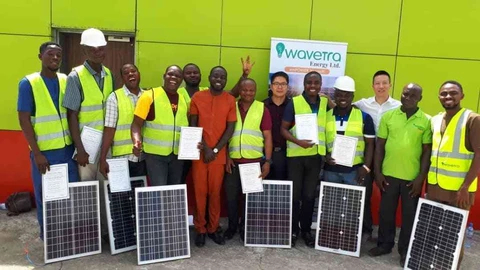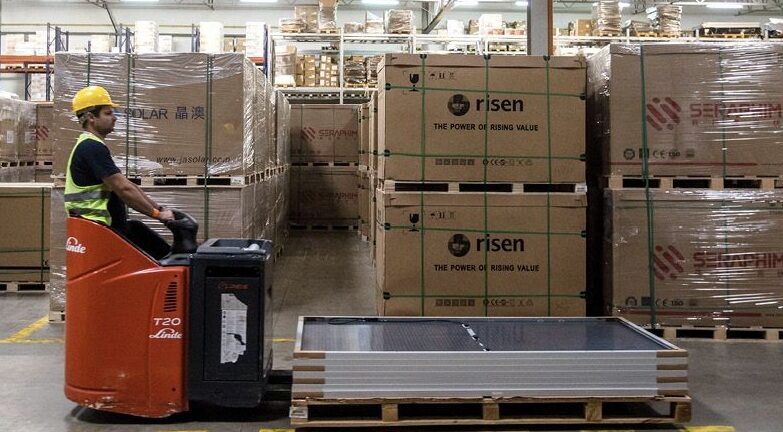Nigeria is now the biggest market in Africa for off-grid energy solutions and the second in the world after India. The solar energy boom did not only increase access to affordable electricity in Nigeria; it also created the need for an efficient and competent workforce with the requisite technical skills for the renewable energy industry.
In response, solar training institutes and centers have sprung up all over the country, offering an impressive array of courses ranging from ‘Solar Panel Installation and Inverter installation’ to ‘How to Write Solar Business Proposals’. Many jobless Nigerians – especially the young – are enrolling at the institutes to receive training for which, after graduating, they are almost certainly guaranteed employment either in already established solar companies, or via their own startups.
One remarkable feature of some of Nigeria’s renewable energy training institutes is their ability to organize training courses in different parts of the country as the demand for solar products and manpower grows daily. Most private homes need a solar panel. The same could be said for businesses, from larger companies in big cities to small football viewing centers in far-flung rural villages.
Wavetra Energy Academy is one of the institutes that has established solar energy training centers across Nigeria. According to a statement by the academy, it has created a team that can organize solar training programs anywhere in the country. It also says they have assembled the best solar technology experts from Nigeria and manufacturers from Asia to teach people how to install complete solar and inverter systems, and also how to diagnose and fix errors.
The countrywide reach of some of the institutes is good for Nigeria. The country’s unemployment rate at the second quarter of 2020 stood at 27.1%. (21.7 million people). That explains why many unemployed Nigerians are enthusiastically embracing the opportunity offered by solar institutes to acquire a skill very much in demand and growing by the day.
It is estimated that proportionally, the solar industry is now creating jobs at a rate six times more than other sectors in the country. According to a Report by Powering Jobs Census 2019, which carried out the first annual job survey for the decentralized renewable energy (DRE) sector in emerging economies, in 2017–18, the Nigerian DRE sector employed about 9,000 informal workers. It added that the newly acquired or enhanced electricity access may have enabled the creation of 15,000 productive use jobs and projected that by 2022–23, the DRE sector will provide more than 52,000 direct, formal jobs and about 24,000 informal jobs.
While renewable energy institutes like Wavetra admit and train candidates with different academic backgrounds, others like Rubitec Academy, a subsidiary of Rubitec Limited (Rubitec Africa), target university and polytechnic graduates. The academy partners with academic and training institutions in Nigeria and abroad to develop future leaders in Renewable Energy and Environment Sciences – a very welcome opportunity for the multitudes of unemployed Nigerian graduates.
It could also be said that the institutes are impacting positively on Nigeria’s employment landscape, because they equip their students to become solar entrepreneurs. For example, the Renewable Energy Technology Training Institute (RETTI) in Lagos has established the Growth Support Plan, an after support platform for their graduates, at no extra cost, to help them start and grow their businesses and be employable in a solar company.
Founder and CEO of RETTI, Glory Oguegbu, says she is passionate about solar and committed to educating thousands of young Nigerians including engineers and other interested individuals to be efficient technicians and providers of solar electricity, and also mentoring and guiding them to establish as renewable energy entrepreneurs.
“There’s an increase in the demand for solar energy. It is therefore paramount to prepare entrepreneurs to meet this rising need and groom an efficient pool of competent workforce for the established solar companies. Our solar/inverter installation training equips people with the skills to set up their own business in Nigeria. Through our Growth Support Plan an alumnus receives business advisory, access to job opportunities, access to hands-on solar installations, free webinars and seminars, all of which help alumni members to enhance the skills they enquired at the training,” she told pv magazine.
Some the products of solar education in Nigeria have already emerged as great entrepreneurs and innovators in the country’s renewable energy industry. A RETTI graduate, Ese Oruade, recently invented a Smart Covid-19 solar-powered automatic mobile hand washing machine. The Founder and CEO of Sere Integrated Electrics Limited (SIEL) in Lagos says he owes RETTI a debt of gratitude.
He told pv magazine, “I heard about RETTI trainings over the radio late 2019. The passion and expertise I sensed in the convener was so overwhelming that I had to call the phone number given after the show… and that was the beginning of my breakthrough in the solar PV system world. There [RETTI] everything anyone who aspires to be in the renewable energy business (especially Solar PV systems) was taught from scratch to pretty advanced level.
“We were taught the need for a green environment, SDGs, solar PV systems design and installation (both theories and practical aspects). Also, we were taught solar entrepreneurship, and business advisory was given. Interactive classes were also held; specifically, that was the ‘physical birthplace’ of my company Sere Integrated Electrics Limited (SIEL).”
Like other emerging service providers in the off-grid energy sector, Oruade believes Nigeria needs more renewable energy training institutions to train more people, especially the youth on solar technology, in order to solve its unemployment problem.
“Not just any kind of training institute but purpose and quality-driven ones, the likes of RETTI. They should be students-focused.” he said, adding, “During my training with RETTI, most of the students/trainees were ladies who had zero engineering background but at the end of the training, they were able to design and install solar projects, including the calculations involved. After-training follow-up and guidance will go a long way in creating solar entrepreneurs, thereby reducing unemployment level in the country.”
Such optimism exuding from someone that received training in renewable energy is a clear indication that solar education will certainly continue to be a catalyst for job creation in Nigeria.
By Patrick Olisa
This content is protected by copyright and may not be reused. If you want to cooperate with us and would like to reuse some of our content, please contact: editors@pv-magazine.com.



I really think even India should take such steps towards solar industry this will help our nation in getting cheaper power and being among the countries which has highest population we also have lots of manpower and Solar industry will help in generating more jobs. Could also solve our unemployment problem.
Now, with the issue of Renewable Energy, the Government of Liberia has no idea or knowledge of how Solar energy could work for everyone, leaders proffer to take off tariff on harmful drugs and increases hard tariff on PV & it’s equipments, at the results, it makes it unaffordable, unaccessable for it poor citizens which continues to live in total darkness with 8-9 hours sunshine everyday, everywhere.
Quaqua K Korlewala, incoming entrepreneur in Solar.
The content is highly educative and informative.